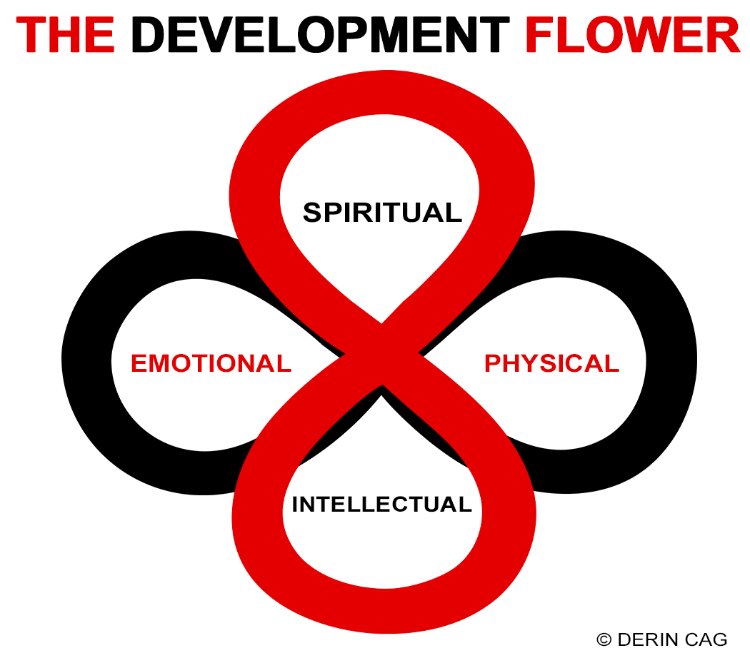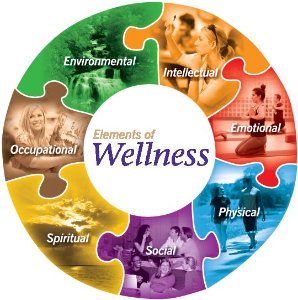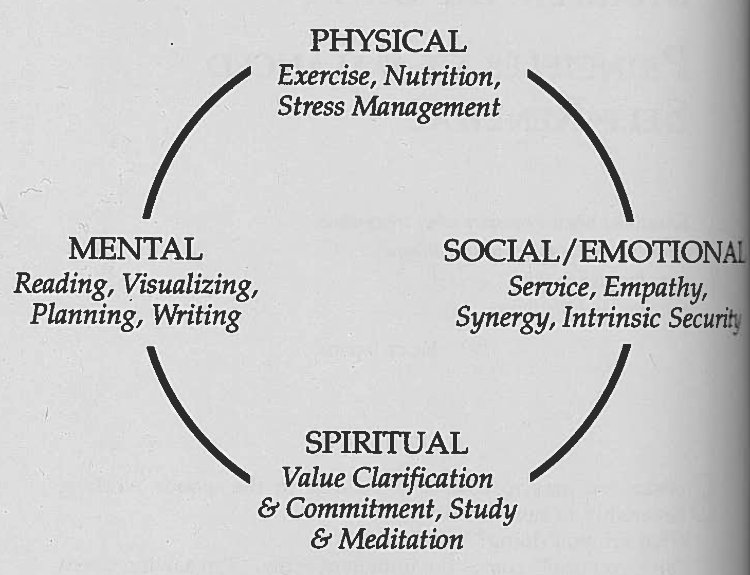

Most people are aware of their unhealthy behaviors and seem satisfied with their life as long as they are free from symptoms of disease (Hoeger & Hoeger, 2003). The term wellness has been defined in many ways. Although there may be a variety of views on what wellness encompasses. The National Wellness Institute, along with other professionals such as health educators, physical educators, nurses and physicians, in health and wellness, share many interpretations and models of wellness.

There appears to be a general agreement that wellness is a conscious, self-directed and an evolving process of achieving full potential. Wellness is a multi-dimensional and holistic, it encompasses a lifestyle of mental, emotional, physical and spiritual well-being, a good environment and positive / affirming beliefs (National Wellness Institute, 2006).

It is clear that we must understand the important role wellness plays in entrepreneurship, accepting the reality that each dimension must be fostered for the achievement of a balanced and productive lifestyle.
It could be stated that, life as an entrepreneur is hectic. Many people do not notice that they could improve their lifestyle. The reason is most likely because they are in good condition and all tasks could be done in a proper way.
When an entrepreneur is not concerned about wellness as a whole, they could easily get affected by health problems such as insomnia and negative thoughts. When an entrepreneur is not in a good condition, it is likely to effect their health and ruin the business.

Many entrepreneurs are not concerned about health and wellness even though this element is a way for them to measure their success in the future.
Much more could be done to increase ones freedom from disease and disability, promoting a state of well-being and developing adequate levels of physical, mental, spiritual and social activity. Ardell (2005) (a lifetime devotee to wellness research) states that the conscious choice involved in taking responsibility for improving the quality of one’s life by adopting changes in various areas of one’s lifestyle results in a high level of well-being. Hatfield & Hatfield (1992) emphasized the cognitive processes involved in enhancing overall well-being within various domains: intellectual, physical, social, emotional, and spiritual.


Emotional Wellness
Emotional wellness includes the degree to which one feels positive and enthusiastic about oneself and life (Hettler, 1980). Another description is the ability to understand one’s feelings as well as those of others, accepting a persons or one’s own limitations, and achievement of emotional stability. It also implies the ability to express emotions appropriately, adjust to change, cope with stress, and enjoy life despite disappointments and frustrations (Floyd, Mimms & Yelding, 2003; Power 7 Dodd, 2003).
Emotional wellness could be conceptualized as awareness and control of feelings, as well as a realistic, positive, and developing view of the self, conflict and life circumstances, coping with extroverts could be an outcome of higher levels of the positive affect. The relation between wealth and well-being is at best a low positive one, although it is clear that material supports can enhance access to resources that are important for happiness and self-realization. There appears to be many risks to poverty but few benefits to wealth when it comes to well-being. Maintaining emotional wellness requires monitoring and exploring thoughts or feelings, identifying obstacles to emotional well-being, and finding solutions to emotional problems.

According to Hettler (1980), conceptualized emotional wellness is a continual process that incorporates the awareness, constructive expression, and management of emotion. As well as a realistic self-assessment and a positive approach to life, such as challenges, risks and conflicts, which are viewed as healthy opportunities to develop further. Successful entrepreneurs tend to have the ability to constructively express, manage and integrate their feelings.

Physical Wellness

Physical development encourages learning about diet and nutrition while discouraging the use of tobacco, drugs and excessive alcohol consumption. Optimal physical wellness is met through the combination of good exercise and eating habits. The physical dimensions of wellness entail personal responsibility and care for minor illnesses and also knowing when professional medical attention is needed. A physically fit individual should be able to perform moderate to vigorous levels of physical activity without becoming tired.
It also includes avoiding risky sexual behavior. The long-term benefits of physical activity includes decreased risk of cardiovascular disease, lower diabetes risk, decreased risk of colon cancer and lower blood pressure in those with high blood pressure. Physical activity is important not only for adults but for adolescents and children as well.

Physical wellness is the active and continuous effort to maintain the optimum level of physical activity and focus on nutrition, as well as self-care and maintaining healthy lifestyle choices. Physical wellness also includes the perception and expectation of wellness, as well as the acceptance of one’s physical state, such as body-image and disability. The definition focuses on an individual moving towards a full personal potential without comparing his or her progress with that of others. For example, an entrepreneur with a physical disability could be considered to be well by moving towards his or her own optimal level.
The benefits of physical wellness include looking better and feeling terrific more often. The psychological benefits are an enhanced self-esteem, self-control, determination and a sense of direction.
Intellectual Wellness

Based on research, less successful entrepreneurs are not concerned about education, that means they look for short-cuts to gain and find new knowledge to improve their business.
Ranger et al (2000) defined intellectual wellness as one’s orientation and achievement towards personal growth, education and achievement, and creativity. Continual personal growth and education includes attending cultural events and seeking opportunities to gain and share knowledge.
In addition, (Hoeger & Hoeger, 2003; Hoeger et al, 2002) defines intellectual wellness as the ability to apply knowledge that a person has acquired, create opportunities to learn more, and engage the mind in lively interaction with the world around them. Intellectual wellness includes being open to new ideas, a capacity to question, to think logically and be creative. An active mind is essential to wellness; it detects problems, finds solutions, and directs behavior (DiMonda, 2005). People who enjoy intellectual wellness never stop learning; they seek out new experiences and challenges (Fahey, Insel, Roth, 2003).
Spiritual Wellness

For entrepreneurs to become more successful, not only should they focus on how to improve their business operations, but to improve their internal values – so that they could manage things with a calm mind and body.

Now here’s something else…
Entrepreneurial Performance

Entrepreneurs tend to be confident in themselves and their abilities. They recognize that they don’t know everything or control all the available resources. Instead, they have a keen ability to understand what they need. The ability to understand and see opportunity is critical for success, and that comes with wellness. Entrepreneurs like to challenge themselves and search for opportunities.
The qualities of successful entrepreneurs refer to the traits mentioned throughout this article, which enable an entrepreneur to do what is expected and succeed in business. It is the combination of these characteristics that enable people to perform as successful entrepreneurs.

Conclusion
Based on the development flower, all the variables are significant. Anyone can change a behavior or lifestyle, however, many adults fail in making these changes. Physical activity is not just for athletes, but for all people. The same goes for learning new stress management techniques. In conclusion, it is essential to keep on developing emotionally, physically, intellectually and spiritually throughout life; entrepreneurs should be concerned about their wellness if they truly want long-term success.
References:
Adam, T, B, Bezner, J, R, Drabbs, M, E, Zambarano, R, J, & Steinhardt, M, A, (2000). Conceptuallizations and measurement of the spiritual and physchological dimensions of wellness in a college populations, College Health, 48, 165-173.
Anderson D.R, Whitmer, R, W, Goetzel, R,Z Ozminkowski, R,J, Wasserman, J, & Serxner, S, (2000), Health Enhancement Research Organization (HERO) Research Committee. The Relationship Between Modifiable Health Risks and Group –Level Health Care Expenditures. American Journal for Health Promotion, 15: 45-52.
Archie, S, M, Goldberg, J, O, Akhtar-Danesh, N, Landeen, J, McColl, L, & McNiven, J, (2007). Psychotic disorders, eating habits, and physical activity: Who is ready for lifestyle changes? Psychiatric Services, 58(2), 233-239.
Ardell, D, B, (2002). Wellness- Another explanations of how it is different from ordinary health. Retrieved March 20, 2007, from http:/www.seekwellness.com/wellness/reports/2002-03017.htm
Arizona State University. The campus definition of Wellness found on the website www.asu.edu/upsa/wellness/definition. Accessed 08-03-03
Bezner, J, R, Adams, T, B, & Whistler, L, S, (1999). The relationship between physical activity and indicators of perceived wellness. American Journal of Health Studies, 15(3, 130-138)
Chambers, R, Wall, D, & Caampbell, I, (1996). Stress, coping mechanisms and job satisfaction in general practitioner registrars. British Journal of General Practice, 46, 343-348
Ellison, C. W. (1983). Spiritual well-being: Conceptualization and measurement. Journal of Psychology and Theology, 11, 330-340.
Fahey, T. D., Insel, P.M., & Roth, W, T (2003). Fit & Well. San Fransico, CA: McGraw Hill.
Harari, M. J., Waehler, C. A., & Rogers, J. R. (2005). An empirical investigation of a theoretically based measure of perceived wellness. Journal of Counseling Psychology, 52, 93-103.
Hettler, Bill. (2003) The Six Dimensional Model of Wellness. Websites of the National Wellness Institute, www.nationalwellness.org Accessed 5-20-03
Ingersoll, R. E (1994). Spirituality, religion, and counseling: Dimensions and relationships. Counseling and Values, 38. 98-111.
Ingresoll, R. E. (1998). Refining dimensions of spiritual wellness: A cross-traditional approach. Counseling and Values, 42, 156-165.
Merrett, C. D., and Gruidl, J.J. (2000), “Small business ownership in Illinois: The effect of gender and location on entrepreneurial success”, Professional Geographer, Vol, 52, No 3, pp, 425-437.
Miller, D., Madsen, S. R., and Cameron, R. J. (2006), “Readiness for changes: implications on employee’s relationship with management, job knowledge and skills, and job demands’, Journal of Applied Management and Entrepreneurship, Vol 11 No 1, pp. 3-16.
Moser.Con. 1989. Gender planning in third world: meeting practical and strategic gender needs, World Development, 17(1): 799-825.
Myers, J. E., Sweeney, T. J & Witmer, J. M (2000). The Wheel of Wellness: A holistic model for treatment planning. Journal of Counseling & Development, 78, 251-266.
Renger, R.F Midyett, S. J, Mas, F, G, Erin, T. E, McDermott, H,M., Papenfus, R,L, Eichling, et al (2000). Optimal Living Profile: An inventory to assess health and wellness. American Journal of Health Promotion, 24, 403-412.
Seligman, M. & Csikszentmihalyi, m. (2000). Positive psychology: An introduction. American Psychologist, 55, 5-14.
Srinivasan, R, Woo, C, Y, & Cooper, A, C, (1994), “Performances Determines for Male and Female Entrepreneur,” Babson College Entrepreneur Research Conference, Boston, MA.




